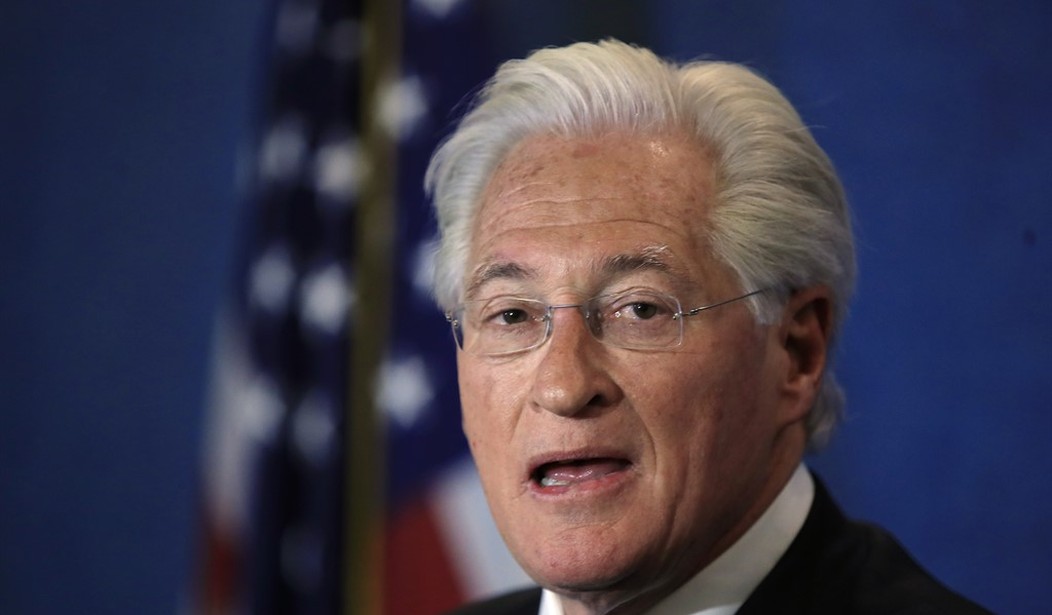Did James Comey violate the law with a leak to the press about his conversation with Donald Trump in February? Comey admitted yesterday in his testimony that he gave a copy of his memo-to-file to “a good friend of mine who’s a professor at Columbia Law School,” with the intention that he make its contents public:
This touched off a number of calls from Trump supporters to have Comey investigated for leaking government documents. This morning, Donald Trump broke a two-day-old Twitter fast to castigate Comey as “a leaker”:
https://twitter.com/realDonaldTrump/status/873120139222306817
Shortly afterward, Trump’s private attorney Marc Kasowitz pledged to take action over Comey’s leak. CNN reports that Kasowitz will file a complaint with the Inspector General’s office at the Department of Justice:
President Donald Trump’s outside attorney plans to file a complaint against former FBI Director James Comey with the Justice Department Inspector General and the Senate judiciary committee, two sources with knowledge of the situation told CNN.
The complaint will focus on Comey’s testimony that he gave a friend the content of memos about his conversations with Trump and asked the friend to then give that information to a reporter. Comey said Friday that he gave the friend — later identified as Daniel Richman, a longtime Comey confidante and Columbia University professor — the information after Trump tweeted that he may have tapes of his conversations with the fired FBI director.
Good luck with that. While it’s true that Comey admitted leaking a document, it’s not at all clear that it crossed any lines, legal or otherwise. Comey noted that he created it on a laptop which had been cleared for classified work, but not everything that gets created on a classified computer is itself classified. The memo in question did not reveal classified information either, nor did it violate executive privilege. That’s because (a) Trump never claimed executive privilege in his conversations with Comey, and (b) Trump had already begun publicly discussing the contents of those conversations before Comey have Richman the memo, a point that Kasowitz got wrong in his response:
Kasowitz said, “Although Mr. Comey testified he only leaked the memos in response to a tweet, the public record reveals that the New York Times was quoting from these memos the day before the referenced tweet, which belies Mr. Comey’s excuse for this unauthorized disclosure of privileged information and appears to entirely retaliatory.”
But Kasowitz’s statement offers an inaccurate chronology of events.
Comey was fired May 9 and Trump tweeted May 12, “James Comey better hope that there are no ‘tapes’ of our conversations before he starts leaking to the press!”
The New York Times broke the story of the memo on May 16th, four days after Trump picked the fight on Twitter. Comey had discussed the conversation with his associates, who were apparently the sources for an earlier NYT story on May 11, but … there’s no law about discussing a conversation one has with a president, especially without a claim of executive privilege.
Perhaps the only argument that might pertain with the IG relates to the memo itself. Clearly, Comey created it as part of his work as FBI director and using government resources. That makes it a work product which belongs to the DoJ, so giving the memo to Richman could be a violation — in a strict, technical sense. I’d doubt that there is any precedent at all for punishing those who share unclassified memos-to-file about non-privileged communications (or even retaining them), and it’s hardly the kind of issue that keeps IGs awake at night — especially with much more damaging leaks springing up all over the place.
Besides, are we sure that Comey actually gave Richman the memo itself? Here’s what Comey said, emphasis mine:
“My judgment was I need to get [the memos] out into the public square,” Comey said. “So I asked a friend of mine to share the content of the memos with a reporter. I didn’t do it myself for a variety of reasons, but I asked him to because I thought that might prompt the appointment of a special counsel.”
Comey may have just retyped another document from his own notes to give to Richman, or gave it to him verbally. Recall that the newspapers never did get a copy of the memo itself, which was one of the criticisms of the reporting on it at the time. Whatever else one may think about Comey, he’s no dummy, and he clearly prepares very well for all contingencies. It would be almost unthinkable that he would leave himself vulnerable for any legal action when it could be easily avoided.
All of this misses a larger point that Comey never did answer yesterday, and on which he seems much more vulnerable. Comey insisted that he didn’t think publicizing the conversation about Flynn was a good idea because it would impact the investigation. So why did he do so a week after getting fired? And — more to the point — why did he share it with Richman and the New York Times, but never bothered to share it with the Judiciary and Intelligence Committees in the House and Senate? That’s the point that Team Trump should be hammering, rather than threatening a complaint that will have zero chance of moving forward and have no impact on someone who’s now in the private sector.








Join the conversation as a VIP Member